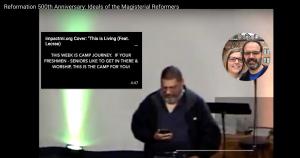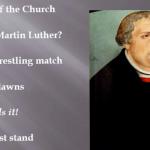Last October was the beginning of the celebration of the Reformation 500th Anniversary. On October 31, 1517, Martin Luther nails the 95 Thesesto the Wittenberg Church door. It’s the common practice to nail a topic to the Church door for discussion.
Peers read posts and start dialogues, but Luther’s post changes history
Bear in mind, we can’t understand the Reformation without history before and after. We usually think of Luther, Calvin, and Zwingli – theMagisterial Reformers. But it’s a reformation era when a lot of changes are made in the whole church. We may want to also bear in mind, they are reformers, not revolutionaries.
We at least know that all three of these Magisterial Reformers do not start out to leave the Roman Catholic Church
Nevertheless, their views eventually set them at odds.
In this complete sermon and prayers, we’re going to look at key thoughts and Scriptures from the Reformation.
We’ll refer to Martin Luther, John Calvin, and Ulrich Zwingli to shed some light. Their doctrines also remind us of things we had forgotten about ourselves.
In honor of John Wycliffe, the “Morningstar of the Reformation,” all Scripture quotations are from the Wycliffe Bible (English Version 1380).
Call to Action (C.T.A.): In this select message, the complete notes are available at Ingle5 on our Connect page.
Scroll down, fill out the Drop Us a Line contact form, and ask for the notes.
Reformation 500th Anniversary: Ideals of the Magisterial Reformers (a/v)
JVI ministering at MT. ZION F.W.C. | 10.29.17
The following are some key quotes and thoughts from Calvin, Luther, and Zwingli from the sermon. Remember, you’re invited to Connect and Drop Us a Line for the compete set of notes (in .pdf format).
i. FaithbeforeWorks is based on Habakkuk 2.4
Romans 1.17: For the righteousness of God is showed in it, of faith into faith, as it is written, For a just man liveth of faith.
Habakkuk 2.4: Lo! the soul of him, who is unbelieving, shall not be right within himself; but the just, or the righteous, shall live by faith.
Martin Luther reflects on these words and states, “At last meditating day and night, by the mercy of God, I began to understand that the righteousness of God is that through which the righteous live by a gift of God, namely by faith . . . Here I felt as if I were entirely born again and had entered paradise itself through the gates that had been flung open.”[1]
ii. Salvation bygrace, not our own merit
Ephesians 2.8: For by grace ye be saved by faith, and this not of you; for it is the gift of God,
John Calvin declares, “On one side, we must look at God; and, on the other, at man. God declares, that he owes us nothing; so that salvation is not a reward or recompense, but unmixed grace . . . When, on the part of man, the act of receiving salvation is made to consist in faith alone, all other means, on which men are accustomed to rely, are discarded. Faith, then, brings a man empty to God, that he may be filled with the blessings of Christ.”[2]
Saving grace is activated by faith, not earned, but received freely. There are other types of grace for living (i.e.Spiritual Gifts are literally graces).
iii. Sola Scriptura
iv. Priesthood of All Believers
(available in the notes)
v. Love is lived out in the principle –All work is God’s work
Martin Luther affirms that we love God and our neighbor through serving and work.
Matthew 25.37: Then just men shall answer to him, saying, Lord, when saw we thee hungry, and we fed thee; thirsty, and we gave thee drink? 38: and when saw we thee harbourless, and we harboured thee; or naked, and we covered thee? 39: or when saw we thee sick, or in prison, and we came to thee? 40: And the king answering shall say to them, Truly I say to you, as long as ye did to one of these my least brethren, ye did to me.
The truth is that judgment will encompass our love for God and man . . . that we live out in our righteous work. So our “ordinary” work is God’s work . . . we love and serve God and others.[3]
Ulrich Zwingli elaborates on all work is God’s work. “Christ is our righteousness. From this it follows that our works are good so far as they are Christ’s, but not good so far as they are our own.”[4]
Invitation to Connect (C.T.A.):
For this sermon, the complete notes are available at Ingle5 on our Connect page.
Scroll down, fill out the Drop Us a Line contact form, and ask for the notes. More sub-topics, Scriptural interpretation from these reformers, and readily available resources in the footnotes are included.
If we’re going to continue to celebrate the Reformation 500th Anniversary this year, then may it not fade (see also my vignette in Doctrine in the Greater Christian Community).
May we keep the ideals of the Magisterial Reformers in front of us as the Body of Christ.
 JVI, Concluding Prayers by Keith Sutton | 10.29.17
JVI, Concluding Prayers by Keith Sutton | 10.29.17
Next week, Professor Vernell Ingle will share the narrative of Martin Luther and the Protestant Reformation, along with his personal notes as well.
He states, “My notes are only in outline form.”
One Christian leader recently told me about how she admires the persistence of Martin Luther, because his persistence is what propels the Reformation forward.
When speaking with Professor Ingle about her point, we both agree that the very fact that Luther translates the entire Bible from Erasmus’ version into German – in only one year – may very well be an example of his persistence!













